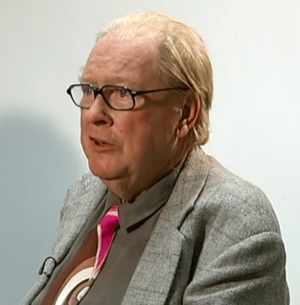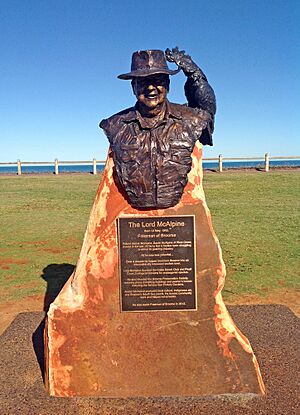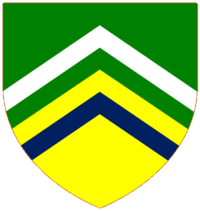Alistair McAlpine, Baron McAlpine of West Green facts for kids
Quick facts for kids
The Lord McAlpine of West Green
|
|
|---|---|

McAlpine in 2012
|
|
| Member of the House of Lords | |
| In office 2 February 1984 – 26 May 2010 |
|
| Personal details | |
| Born |
Robert Alistair McAlpine
14 May 1942 Mayfair, London, England |
| Died | 17 January 2014 (aged 71) Diso, Lecce, Italy |
| Children | 3 |
Robert Alistair McAlpine, Baron McAlpine of West Green (born May 14, 1942 – died January 17, 2014) was a British businessman, politician, and writer. He was an important advisor to Prime Minister Margaret Thatcher.
McAlpine came from a wealthy family known for building. He worked in different jobs before becoming famous in British politics in the 1980s. He was the treasurer and a main fundraiser for the Conservative Party. He was a close friend of Margaret Thatcher. However, he did not support the next Prime Minister, John Major. Later, he joined the Referendum Party led by James Goldsmith. McAlpine eventually rejoined the Conservatives but left his position in the House of Lords.
Outside of politics, McAlpine was involved in many business projects in Australia. He was also a collector of art and wrote books about his life.
Contents
Early Life and Career
McAlpine was born in Mayfair, London. His great-grandfather, "Concrete Bob" Robert McAlpine, started the famous McAlpine construction company. Robert Alistair was the second son of Edwin McAlpine.
He described his childhood as happy but not fancy. He went to boarding school at age six. He had dyslexia, which is a learning difficulty that affects reading. He left school at 16 with three basic qualifications. After school, he worked on a McAlpine building site, helping with timekeeping and wages.
At 21, McAlpine became a director of the family company. He earned money by developing properties in Australia. He worked in the building business until he entered politics.
In the 1960s, McAlpine started his own publishing company in London. He was also an art dealer and collected many artworks. He even owned a zoo in Broome, Western Australia. He was interested in gardening, beekeeping, and loved to travel.
Politics and Public Service
McAlpine was very impressed by the new leader of the Conservative Party, Margaret Thatcher, in 1975. She soon made him the Conservative treasurer, a job he held until 1990. They worked closely together while she was Prime Minister. He led the efforts to raise money for the Conservative Party's election campaigns. He wrote a book called The Servant about his relationship with Thatcher.
McAlpine was known as a very successful fundraiser for the party. He would often meet with business leaders to discuss politics. He helped the Conservative Party raise a lot more money for elections. For example, the party raised £1.5 million before he became treasurer. By the 1979 election, this had grown to £4 million, and over £9 million by 1990.
McAlpine was nominated to the Arts Council of Great Britain in 1980. He served on the Council from 1981 to 1982. He was also chairman of the Theatre Investment Fund and a trustee of the Royal Opera House.
In 1984, McAlpine was given a special title: Baron McAlpine of West Green. This meant he became a life peer and could sit in the House of Lords.
Because of his important role, McAlpine was sometimes at risk. He was with Thatcher's team when the Provisional Irish Republican Army (IRA) attacked the Grand Hotel in Brighton in 1984, but he was not hurt. In 1990, the IRA bombed West Green House, a home where he had lived. For safety, McAlpine decided to move to Monaco and Venice in the mid-1980s.
McAlpine was a deputy chairman of the Conservative Party from 1979 to 1983. After Thatcher left office in 1990, he remained very loyal to her. He did not like her successor, John Major, especially Major's ideas about the European Union. McAlpine joined James Goldsmith's Referendum Party in 1996. He was then removed from the Conservatives in the House of Lords. After Goldsmith died, McAlpine became the leader of the Referendum Party, but the party soon ended. He was very critical of the Conservative Party for a while. He sat as an Independent Conservative in the House of Lords before rejoining the Conservatives later.
Adventures in Australia
McAlpine first visited Western Australia around 1960. In the mid-1960s, he worked in Perth, building office blocks and the city's first five-star hotel.
In the 1980s, McAlpine worked to boost tourism in Broome. He loved Broome and saw its potential for tourism. He invested a lot of money in projects there. He helped restore old buildings, fix up a cinema, and create the Cable Beach Resort club and the Pearl Coast Zoological Gardens. He also bought a share in a pearl farm and helped promote the famous South Sea Pearl. He supported local culture, including Aboriginal artwork. He spent several months a year living there.
McAlpine also gave money to charities and new businesses. Although there were some challenges, many of his projects lasted, like the Cable Beach club. When he visited Broome again in 2012, he was welcomed warmly. The town leaders honored him as a "Freeman of the Municipality" for his contributions.
Art and Collecting
McAlpine was a passionate collector of many different things since he was young. As a child, he had a "cupboard of curiosities" with interesting items like a snake in a bottle. Later, he collected beads, books, furniture, police batons, dolls, textiles, and even rare types of chickens. He also collected Renaissance tapestries.
He was one of the first people to collect paintings by the American artist Mark Rothko. He was very interested in Abstract expressionism and artists like Morris Louis and Jackson Pollock. He also collected art by Australian painter Sidney Nolan. McAlpine gathered folk art from different parts of the world. In the 1980s, he ordered 100 stone sculptures of human heads from an artist named Big John Dodo. He also liked modern sculptors. He owned an art gallery in London. He had a warehouse for his collections, but he also sold or gave parts of them to museums.
In 1970, McAlpine donated 60 sculptures to the Tate museum. These included works by famous artists like William Turnbull and Phillip King.
McAlpine also created interesting structures called "follies" in the gardens of West Green House. Follies are buildings built just for decoration. One of these was a tall column with a Latin message saying it was built with money that might otherwise have gone to taxes. He also built a classical arch dedicated to "the first lady Prime Minister of Great Britain" (Margaret Thatcher).
Personal Life
McAlpine lived in many places around the world, including England, Australia, Paris, Venice, and Southern Italy.
He had heart surgery in 1987 and again in 1999. The second surgery caused complications, making it difficult for him to speak. After being in a coma, he became a Catholic. He said he felt "more casual about life" after this experience.
Marriages and Family
McAlpine was married three times. His first marriage was in 1964 to Sarah Baron. They had two daughters. They divorced after he became the Conservative Party treasurer.
In 1980, he married Romilly Hobbs, who had been his political secretary. She was known as a great hostess during Thatcher's time as Prime Minister. McAlpine and Romilly had a daughter, Skye McAlpine, who is now a cookbook writer. They divorced after his second heart operation.
In 2002, McAlpine married his third wife, Athena Malpas. She was from a Greek shipping family. They met when she worked for the Referendum Party. They got married in Paris, and his daughters, with whom he had reconnected, were there. They moved to Southern Italy, where they renovated an old convent and opened a bed and breakfast.
Death
Robert McAlpine died at his home in Italy on January 17, 2014, at the age of 71.
Arms
|
Writing and Books
McAlpine wrote several books, sometimes with others. He also wrote for magazines like The World of Interiors. Here are some of his books:
- The Servant (1992): This book talks about his relationship with Margaret Thatcher. He later included it in a collection called The Ruthless Leader.
- Letters to a Young Politician – From his uncle (1995).
- Once a Jolly Bagman: Memoirs (1997): This book shares his memories and includes his thoughts on people he worked with.
- The New Machiavelli: The art of politics in business (1998).
- Collecting and Display (1998), with Cathy Giangrande.
- The Collector's Companion: A source book of public collections in Europe and the USA (2001), with Cathy Giangrande.
- Bagman to Swagman (1999).
- Adventures of a Collector (2002).
- Triumph from Failure: Lessons from Life for Business Success (2003), with Kate Dixey.
 | James Van Der Zee |
 | Alma Thomas |
 | Ellis Wilson |
 | Margaret Taylor-Burroughs |




